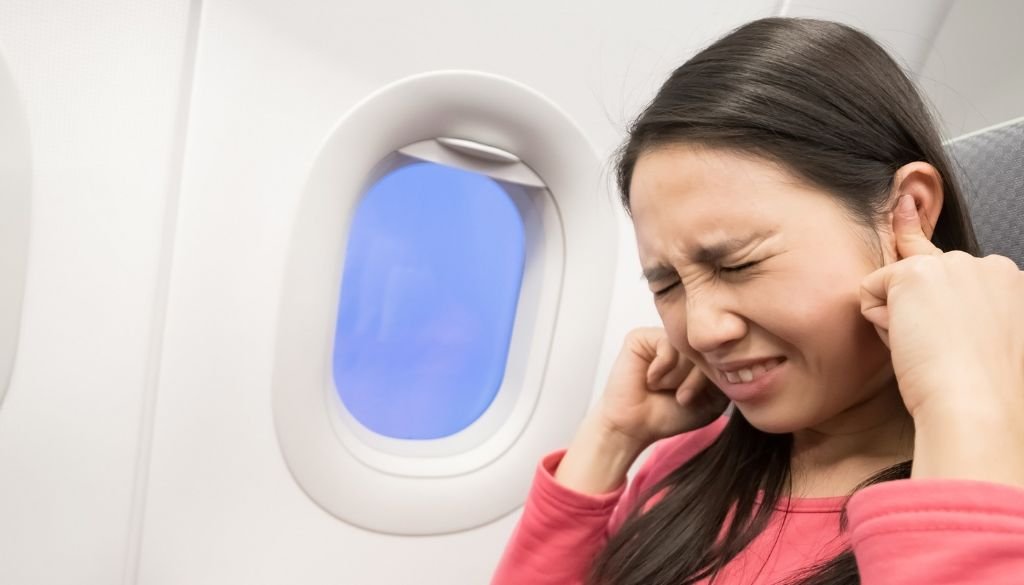Can you fly with tinnitus? This is a common question among people who experience the perception of ringing or buzzing in their ears, known as tinnitus. The condition varies in intensity and frequency, and those affected often worry about how air travel might impact their symptoms. Given that changes in air pressure during flights can influence ear function, it’s crucial to understand how flying might affect tinnitus. This article will explore the connection between tinnitus and air travel, offering expert insights and practical tips to manage tinnitus symptoms while flying.

Key Takeaways
- Flying with tinnitus can pose challenges due to changes in air pressure.
- Pressure changes during air travel can exacerbate tinnitus symptoms.
- Precautions can be taken to minimize the impact of air pressure changes on tinnitus.
- Consulting with a healthcare professional is recommended for personalized advice.
- Proper ear health and equalizing techniques are essential for managing tinnitus while flying.
The Impact of Air Travel on Tinnitus
Air travel and tinnitus can be challenging for individuals who experience ringing or buzzing sounds in their ears. The rapid changes in air pressure during flights can worsen tinnitus symptoms, causing discomfort and distress. This is because the pressure changes can affect the ears, leading to issues such as a blocked feeling, earaches, or temporary hearing loss.
It’s important to note that certain factors can increase the risk of complications during air travel for individuals with tinnitus. Conditions like a small Eustachian tube, sinus or throat infections, or allergies can make it more difficult to equalize the pressure in the middle ear, exacerbating tinnitus symptoms. Therefore, taking precautions to minimize the impact of air pressure changes is crucial for a comfortable flying experience.
By following expert advice and implementing simple strategies, individuals with tinnitus can better manage their symptoms while flying. These strategies include equalizing ear pressure, using earplugs or noise-canceling headphones to minimize the impact of cabin noise, and staying well-hydrated throughout the flight. Additionally, consulting with a healthcare professional for personalized advice based on one’s specific condition and medical history is highly recommended.
Does weather affect tinnitus? Our exclusive feature on ‘does weather affect tinnitus’ investigates the correlation between weather changes and symptoms.
Tips for Flying With Tinnitus:
- Practice ear pressure equalization techniques, such as swallowing, yawning, or using the Valsalva maneuver.
- Use earplugs or noise-canceling headphones to reduce the impact of cabin noise.
- Stay well-hydrated by drinking plenty of water before, during, and after the flight.
- Avoid excessive alcohol or caffeine consumption, as they can worsen tinnitus symptoms.
- Consider booking an aisle seat for easy access to walk around and stretch during the flight, which can help alleviate discomfort.
Remember, while flying with tinnitus can be challenging, taking proactive steps to manage symptoms and reduce the impact of air pressure changes can significantly improve the overall flying experience.
Tips for Flying With Tinnitus
Flying with tinnitus can be challenging, but by following these tips, you can help manage your symptoms and have a more comfortable experience:
- Please consult your healthcare professional: Before your flight, you must speak with your doctor about your condition and potential concerns. They can provide personalized advice and recommendations based on your medical history.
- Practice relaxation techniques: Flying can be stressful, potentially exacerbating tinnitus symptoms. Try relaxation techniques such as deep breathing, meditation, or listening to calming music to help reduce stress and promote a sense of calm during the flight.
- Use earplugs or noise-canceling headphones: Protecting your ears from loud noises during the flight can help minimize the impact on your tinnitus. Consider using earplugs or noise-canceling headphones to reduce the overall noise level and make the flight more comfortable.
- Stay hydrated: Keeping yourself hydrated before and during the flight is essential for overall well-being and can help maintain better ear health. Drink plenty of water and avoid excessive caffeine or alcohol consumption, as they can contribute to dehydration.
- Try equalization techniques: During takeoff and landing, you can try equalization techniques to help equalize the pressure in your ears. Chewing gum, swallowing, or yawning can help open the Eustachian tubes and alleviate any discomfort caused by pressure changes.
- Create a calming environment: Bring items that help create a calming environment for yourself, such as a favorite book, music playlist, or stress-relief toys. Having familiar and soothing elements can help distract from tinnitus and make the flight more enjoyable.
By following these tips and taking necessary precautions, you can manage your tinnitus symptoms while flying and have a safer and more comfortable experience. Remember that everyone’s experience with tinnitus may vary, so it’s essential to listen to your body and take the necessary steps to care for your ears and overall well-being.
Managing Tinnitus During Diving
Diving can be exciting and adventurous, but if you have tinnitus, it’s essential to take extra precautions to ensure a safe and comfortable experience. Here are some tips for managing tinnitus while diving:
- Equalize gently and frequently: One of the critical factors in managing tinnitus during diving is equalizing the pressure in your ears. Take your time and gently balance your ears often throughout the dive to prevent any sudden changes in pressure that may exacerbate your tinnitus symptoms.
- Use specialized earplugs: Consider using specialized earplugs designed for divers with tinnitus. These earplugs can help regulate the pressure in your ears and provide additional protection against water entering the ear canal, minimizing the risk of further discomfort.
- Limit your dive depth: Be mindful of the depth at which you dive. Descending to greater depths may increase the pressure on your ears, potentially worsening your tinnitus symptoms. Stay within your comfort zone and discuss with your diving instructor any concerns or limitations you may have.
Remember to consult with your healthcare professional before diving with tinnitus. They can provide personalized advice based on your situation and help determine if diving suits you.

By following these tips and taking the necessary precautions, you can enjoy the wonders of diving while minimizing the impact on your tinnitus symptoms. However, listening to your body and prioritizing your health and comfort during water activities is essential.
Conclusion
While flying with tinnitus can present challenges due to changes in air pressure, there are steps individuals can take to minimize the impact on their condition. It is essential to prioritize ear health and consult a healthcare professional for personalized advice. By practicing equalizing techniques and taking necessary precautions, individuals with tinnitus can have a safer and more comfortable experience traveling by air or diving.
To ensure safe air travel with tinnitus, it is recommended to keep the Eustachian tubes clear by staying hydrated and avoiding excessive alcohol or caffeine consumption. Swallowing, yawning, or chewing gum during takeoff and landing can also help equalize the pressure in the ears. Additionally, using earplugs or noise-canceling headphones can mitigate the impact of background noises and provide some relief.
Read Also: can viagra cause hearing loss?
Coping with tinnitus on a flight may also involve managing stress levels, as stress can exacerbate symptoms. Engaging in relaxation techniques, such as deep breathing or listening to soothing music, can help alleviate stress during the flight. It may also be beneficial to inform the cabin crew about your condition, as they may be able to provide additional support or accommodations.
Remember, tinnitus management during air travel requires a proactive approach. By taking these precautions, individuals with tinnitus can enhance their travel experience and minimize the impact on their condition. However, it is crucial to remember that each person’s tinnitus is unique, and consulting with a healthcare professional is essential for personalized advice and guidance based on your specific condition and medical history.
Frequently Asked Questions
Can you fly with tinnitus?
Yes, it is generally safe to fly with tinnitus. However, changes in air pressure during flights can worsen tinnitus symptoms.
How does air travel affect tinnitus?
Air travel involves rapid changes in air pressure, which can affect the ears. For individuals with tinnitus, these pressure changes can exacerbate their symptoms and cause discomfort.
How can I manage tinnitus while flying?
To manage tinnitus while flying, it is essential to ensure proper ear health, practice equalizing techniques, and take necessary precautions such as chewing gum or using earplugs.
What are some tips for flying with tinnitus?
Some tips for flying with tinnitus include staying hydrated, avoiding alcohol and caffeine, using noise-canceling headphones, and staying calm and relaxed during the flight.
Can I go diving with tinnitus?
Individuals with tinnitus can go diving, but they should take extra precautions to minimize the impact on their symptoms. Pressure changes during diving can worsen tinnitus.
How can I manage tinnitus while diving?
To manage tinnitus while diving, it is essential to equalize the pressure in the ears regularly, avoid diving if you have a cold or sinus infection, and ascend and descend slowly to allow for gradual pressure changes.
What should I do to have a safer air travel or diving experience with tinnitus?
To have a safer air travel or diving experience with tinnitus, it is recommended to consult with a healthcare professional for personalized advice based on your specific condition and medical history. They can provide tailored recommendations and strategies to manage your tinnitus while traveling.



